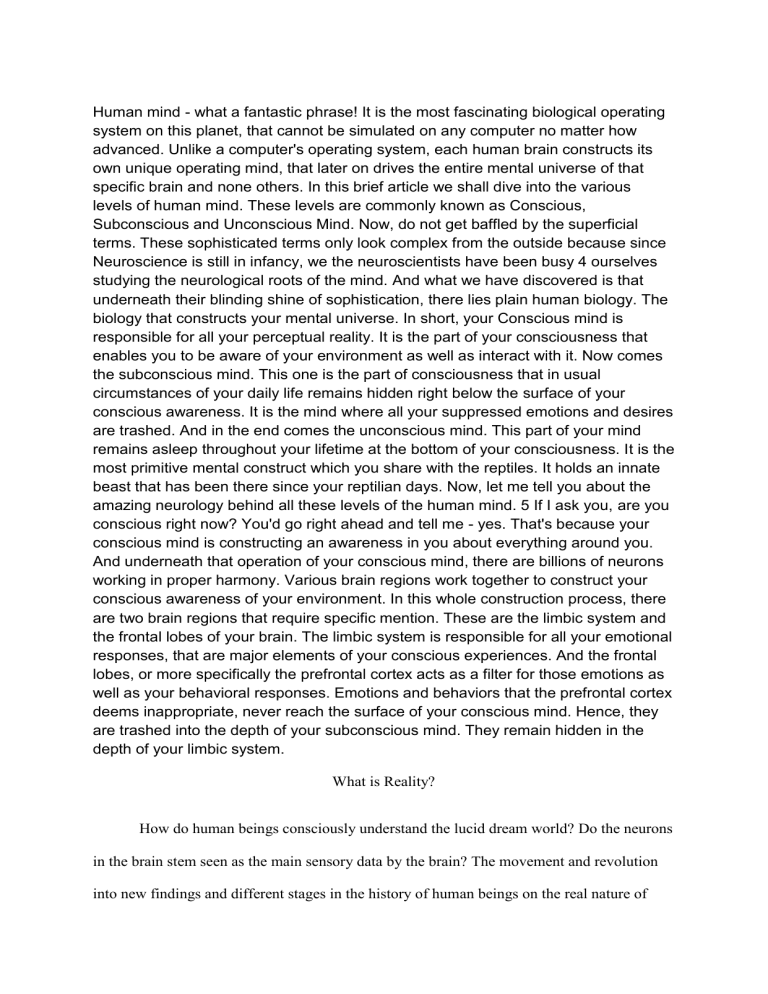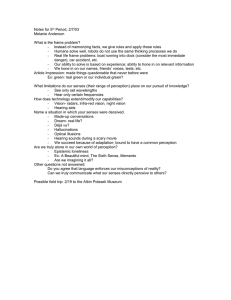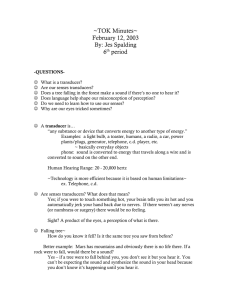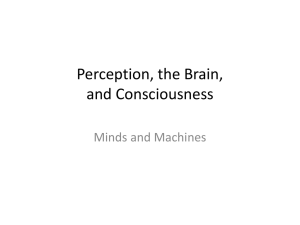
Human mind - what a fantastic phrase! It is the most fascinating biological operating system on this planet, that cannot be simulated on any computer no matter how advanced. Unlike a computer's operating system, each human brain constructs its own unique operating mind, that later on drives the entire mental universe of that specific brain and none others. In this brief article we shall dive into the various levels of human mind. These levels are commonly known as Conscious, Subconscious and Unconscious Mind. Now, do not get baffled by the superficial terms. These sophisticated terms only look complex from the outside because since Neuroscience is still in infancy, we the neuroscientists have been busy 4 ourselves studying the neurological roots of the mind. And what we have discovered is that underneath their blinding shine of sophistication, there lies plain human biology. The biology that constructs your mental universe. In short, your Conscious mind is responsible for all your perceptual reality. It is the part of your consciousness that enables you to be aware of your environment as well as interact with it. Now comes the subconscious mind. This one is the part of consciousness that in usual circumstances of your daily life remains hidden right below the surface of your conscious awareness. It is the mind where all your suppressed emotions and desires are trashed. And in the end comes the unconscious mind. This part of your mind remains asleep throughout your lifetime at the bottom of your consciousness. It is the most primitive mental construct which you share with the reptiles. It holds an innate beast that has been there since your reptilian days. Now, let me tell you about the amazing neurology behind all these levels of the human mind. 5 If I ask you, are you conscious right now? You'd go right ahead and tell me - yes. That's because your conscious mind is constructing an awareness in you about everything around you. And underneath that operation of your conscious mind, there are billions of neurons working in proper harmony. Various brain regions work together to construct your conscious awareness of your environment. In this whole construction process, there are two brain regions that require specific mention. These are the limbic system and the frontal lobes of your brain. The limbic system is responsible for all your emotional responses, that are major elements of your conscious experiences. And the frontal lobes, or more specifically the prefrontal cortex acts as a filter for those emotions as well as your behavioral responses. Emotions and behaviors that the prefrontal cortex deems inappropriate, never reach the surface of your conscious mind. Hence, they are trashed into the depth of your subconscious mind. They remain hidden in the depth of your limbic system. What is Reality? How do human beings consciously understand the lucid dream world? Do the neurons in the brain stem seen as the main sensory data by the brain? The movement and revolution into new findings and different stages in the history of human beings on the real nature of reality are very apparent. The new conclusions and various stages in the history of human beings have suppressed scientific findings, which does not fit the present understanding of reality. Einstein stated that reality is just an illusion, and it is nothing real (Studen, Moore, & Chamberlain, 2016). The quantum realm has shown new findings that reality is not the way it is perceived. A collective consciousness role is to create an experience, illusion, and reality. The manner in which human beings perceive reality is coupled with emotions and feelings, which accompany the perception that makes up the entire experience of the whole earth (Walia, 2012). Scientifically, we can manifest any form of reality based on the type of energy emanated from us. An energy of fear is less productive than the energy of love (Walia, 2012). Thomas Young, a physicist, in his double slit experiment showed how tiny particles do not behave the same when measured (Walia, 2012). This sheds light on how the whole reality operates. This double slit experiment by Dr. Quantum is a clear look at the manner in which consciousness creates reality. Until one can see reality, it stays in the form of a wave of probabilities. The path of action is determined when the wave of action collapse by measuring the reality. This shows that the consciousness moment defines how things act. The infinite potentials and electrons behave in the same manner and show how consciousness define how it need to act. In a practical way, everyone sees the earth in a particular way. The way we perceive things defines us and limits our infinite abilities by keeping us on one path and the cycle repeats itself. We need to realize we dictate our experiences on earth because we are in control. The question that remains is that as long as consciousness creates reality, what defines how things should be, who defines the form of the world, who are we and how should we act? The double slit experiment shows how people are in control of their consciousness. However, our understanding and consciousness can still be manipulated. From birth, we have been taught by the media and education how the world is (Walia, 2012). They have created our perception of how things are and on the true nature of reality. Therefore, what is reality? Does it exist or it has to be measured first? Is there a multiverse? Is it an illusion? The brain perceives one rational understanding of reality though there are other dimensions that we are not aware. The brain usually alters people perception based on the situation they find their self in. The truth about reality is there, and it is an enticing field of research. Besides, it is very crazy and weird than the way we can imagine. People have a different brain, and so it is the reality it gives out. The reality is what your brain tell you it is. The problem ‘what is reality?’ arises from a consciousness of ourselves as living in a world which seems to be outside of, and yet is the cause of, our conscious life. Our reflections on this lead us to wonder if we can know of the world beyond our perceptions – the underlying cause of our consciousness of appearances. This world of the underlying cause we call ‘reality’. Is reality mental – mind; or is it physical– matter and energy? If mind, is there a deeper consciousness underlying appearances that unites us all and is the source of our conscious thoughts? If matter, can we understand how the play of material objects and forces can give rise to conscious life? If reality is mental, we might best connect with it by skillful introspection; by a pure, deep, and penetrating way of thought that would see past appearances and show reality directly to the mind. Alternatively we might passively receive, by a process of revelation, a mental image of reality. In revelation, the cosmic mind could speak directly to us, in apparitions or visions. If ultimate reality is instead composed of matter and energy, the method recommended is more empirical; that is, more reliant on the senses. This method, which we call ‘science’, involves the formulation of statements of proposed facts (observable truths) about the physical, along with statements about relationships between the facts, in the form of physical laws. In science, these statements of laws and proposed facts are subject to criticism and testing by observation and experiment. The statements that at any time best convince, after testing and criticism, are given the status of ‘actual fact’, or if you wish, reality. Revelation resists and endures, because science gives scant comfort to the desire for unification with cosmic reality. But science is relentless, and facts, ultimately, are irresistible. In discussing the nature of reality, we must distinguish between physical reality and immaterial (non-physical) reality. Physical reality is that which is constrained by physics or physical laws. Perhaps the best person to relegate this part of the discussion to would be a physicist, since a physicist is probably more qualified in discussing physical reality then an armchair philosopher such as myself. Immaterial reality then pertains to what is not constrained by physical laws, eg concepts such as ‘character’ and the ‘mind’, Plato’s Forms, the realm of God and spirits. If physical reality is all that is ‘real’, then what is the relationship of immaterial concepts, such as ‘character’, the ‘Good’, and ‘morals’, to this physical reality? Are concepts such as these just the content of our brains and products of our reasoning and emotions? If so, then it is probable these concepts are just subjective and thus non-absolute, since the contents of our beliefs is contingent and always changing. Conversely, if there is a separate and distinct (non-subjective) immaterial reality, and the aforementioned concepts of character, the Good, and morals etc exist as aspects of this reality, then the existence of objective, absolute concepts is possible (maybe even necessary), since the nature of reality is not contingent, dependent on subjective opinion. On the other hand, some questions now arise: if immaterial reality does exist as separate and distinct from physical reality, how would these two realities interact? Is there a distinct location for an immaterial concept (or a form, or spirit) in somewhere such as heaven, Plato’s perfect realm, or perhaps a more local area in the universe? And is there a distinct nature for logic and mathematics, or for the connections that exists between these realities. These are questions for the philosopher and physicist to ponder, and perhaps answer, together. John Gray writes in his 2002 British best seller, "Straw Dogs," "Humans think they are free, conscious beings, when in truth they are deluded animals." The neurologistphilosopher Raymond Tallis lambastes such notions in his 2011 book, "Aping Mankind," where he cites many more examples of reductionism from all corners of contemporary culture. Now, what do I mean by reductionism, and what's wrong with it when we use it as a society to view reality? Every thinking person tries to reduce some things to others; if you attribute your cousin's political outburst to his indigestion, you've reduced the rant to the reflux. But the reductionism that's at stake here is a much broader habit of thinking that tries to flatten reality down and allow only certain kinds of explanations. DEscription: We’ll look at the theories of Plato, Descartes and Locke and their views on what reality is, we look at what perception means to reality, and how everyone’s view on reality is different. As we begin to question what reality is, we learn more about ourselves and our perceptions of life, we begin to question ourselves, and we slowly learn what reality means to us, as individuals. This essay should hopefully encourage deep thinking about reality and existence; it aims to bring individuals to closer to understanding what life means to them. Every day we trust in our senses to tell us the truth, we believe what we see, smell, touch, hear, and taste, but do we ever question whether or not our senses are lying to us, do we ever stop to think that perhaps our senses are being manipulated? If we can doubt if our senses tell us the truth, than how can we know what really exists? An Individual’s perception is completely their own, the way that one person perceives things, may be completely different than the way another individual perceives things. In one passage from Renee Descartes, he questions if beliefs are impossible even though they are derived from the senses. He asked himself “how could it be denied that these hands or this whole body is mine?” He then compares himself to mentally disturbed people saying that mentally disturbed individuals sometimes believe that they are somewhere, or that they see things, that are not correct. Who are we to question someone else’s sanity? What is it that makes our perceptions reality and a mentally disturbed person’s perceptions incorrect? (http://www.writework.com/essay/descartes-view-real) When a sentient being acknowledges that they “exist in a world of physical objects”, they also confirm that their sense perception functions to an extent which allows them to reason, even to a small degree, their physical existence. What is a physical object? Does a physical object have to be something you can see, touch, feel, taste, or smell or can a physical object exist without one being able to confirm its existence? Is the sensory perception of a fly wrong just because it has over a 1000 eyes or is the way humans view the world incorrect because we do not? A blind man can still help a person distinguish a colour because no one perception is ever totally interpreted by only one sensory organ. Many other animals on earth do not just rely on their sight for information about their world. For instance fish in totally dark areas of the ocean have no eyes and yet can still maneuver around in their environment by sensing ripples in their area with special sense organs on their body. Birds also seem to use the magnetic lines of the earth to navigate south for the winter each year. It would be foolish to make the statement that all sensory perception of the world is circumspect and is exactly the same for all creatures. Firstly, we need to look at what perception and reality mean, the definition of perception is the act or faculty of apprehending by means of the senses or of the mind; cognition; understanding. This means that perception is what we sense in our environment from what our senses and mind tells us. The definition of reality is the state or quality of being real (dictionary.com) but if we know what is real because of our perceptions and senses, how do we know our senses can be trusted to tell us the truth, and thus how do we know what is real? Every philosopher has searched within themselves for the answer to what is reality, and how we know what is real, but every philosopher has their own views on reality, to begin idealist Renee Descartes argued that sensations and experience can be doubted, so it is pure reason, not the senses, that must form the basis of Truth and what reality is. Next, an Idealist, Plato who claimed that the world of ideas, for example the ideal nature or essence of a tree or a circle or a color, was more fundamental, more “real,” than physical reality, and that physical reality, a tree for instance, comes into being as an imperfect instance of the ideal. John Locke an empiricist said that the mind starts out without any knowledge and everything one knows is built up from experience through the senses. So who is right? Is there any one way to know what reality really is? In Descartes his first and second meditations he claims that all our beliefs can be doubted because our senses could simply be just an illusion, he goes on to say that although all our beliefs cannot be certain, because we think and experience, our minds must exist. Descartes argued that our ordinary experiences and views of the world cannot give us the kind of affirmed foundation on which all other knowledge and beliefs can be based. We are often dismayed to acknowledge that what we have learned is simply detriment, or that what our senses tell us is not certain. That should make us wonder about whether all the other things we believe might also be uncertain. So is there anything that we can know for certain without a doubt? We can doubt whether there is a physical world and whether we have a physical body. We can doubt whether our own reasoning can be trusted, so then what can we absolutely know for certain? Descartes gives an example that even if a higher power deceives us about all our other beliefs, there is one belief that we can be certain about, which is that we are thinking. Even to doubt this belief is proving that we are thinking. And since thinking cannot occur without there being something that does the thinking, this proves that we exist. When we think, it proves we have a mind, regardless of whether we have bodies. The body we experience as our own is not an essential part of our self because we can doubt its existence in a way that we cannot doubt the existence of our mind. Plato believed that reality was in the form of two separate worlds, he believed that something was an individual object, but could be put together into a larger group. For example there are multiple breeds of cats, but they all fall under a larger group, which is cats, or felines. Another analogy that Plato came up with was the allegory of the cave. Here the physical world is in the form of a cave, in which the humans are trapped from the beginnings of our life, where we are stationary and cannot move our heads, so we perceive only shadows and sounds. Without reason, one of us is released and is encouraged to travel upward to the entrance of the cave. This revelation is very confusing to the person. Then he is pulled to the entrance of the cave, where the light is hurting his eyes that are accustomed to the dark, which threatens the only security his life has known. The world of daylight represents the realm of Ideas. His eyes grow accustomed to the light and he can look up to the sun, and understand what the ultimate source of light and life is. This is symbolic of the Idea of the Good in the Realm. This gradual process is a metaphor of education, and enlightenment. Yet the real lesson of Plato is that the enlightened person now has a moral responsibility to the unfortunate people, still in the cave, to rescue them and bring them into the light. This lesson brings about Socrates’ famous quote, “As for the man who tried to free them and lead them upward, if they could somehow lay their hands on him and kill him, they would do so.” This is ironic in nature. The fact that this man is trying to help these people and they are so uneducated masses will resent him and threaten his life. Lastly, John Locke stated that we define objects by primary and secondary properties; primary properties being undeniably objective features such as size and shape, and secondary properties being subjective such as colour and taste. (http://www.youtube.com/watch?v=7dQpDNtsIAE) Locke’s theory on reality is called Representative Realism, it is the view that sense data (an immediate object of perception, which is not a material object; a sense impression) somehow represents the objects and that these objects are causally involved in our production of the sense data. Our perception of objects is thus indirect; hence, representative realism is a kind of indirect realism. (An Introduction to Epistemology, second edition, 277) This view argues that we experience reality indirectly by perceptions that represent the real world. So, if we see a brown table, what we are actually seeing is not the table itself but a representation of it. In this way, differences of perception which occur due to changes in light conditions, position of viewer, etc., can be easily explained: it is not the object which is changing, only the perception of it. As an example, a man is standing on the corner of a busy road and witnesses two cars collide. Neither driver is hurt, but both step out of their cars to inspect the damage. Driver A is a young mother with a young child in the back of the car; driver B is a business executive in a hurry; the witness is an old man wearing glasses. As the two drivers argue about whose fault it was, the man approaches them and offers to confirm what he saw happening. What does each of them see? Whose is the correct view? It is evident that the mind knows not things immediately, but only by the intervention of the ideas it has of them. Our knowledge therefore, is real, only so far as there is conformity between our ideas and the reality of things. But what shall be here the criterion? How shall the mind, when it perceives nothing but its own ideas, know they agree with things themselves? (John Locke, 452) So who is right? These are just three different views on reality out of hundreds, and possibly even thousands from other philosophers, but is there any one way to know if one philosopher’s theory is right over another? One thing most of these theories have in common is that our perceptions of reality, how we view things through our senses and the different objects we see, may not be what is certainly real, they suggest that what our perceptions of reality are, are not really what reality is. What this means is that for the average person living, their reality is based upon ignorance towards other truths. Throughout the span of humanity, we as a species have looked upon the workings of the universe through the lens of religion, using it to explain the unexplainable. However, secularized sciences began to surface and thus, scientific explanations began to replace religious beliefs. What was previously the affliction of ignorance towards the people who used religion to perceive the world around them transformed into a truth. However, as the sciences and technology grew more advanced, previous scientific theorems began to be disproved by newly discovered ones. Again, the ignorance transforms into truth; nonetheless, each and every time ignorance converts to truth new ignorance manifests. As an example in while inside the matrix, Neo had no idea that his reality was created by the workings of a machine. To him, the food he ate was real, and the punches he took in the face were painful. He perceived the mechanical world he resides in to be reality, to be real. However, as soon as he awakens to the new reality, outside of the machine, his previous life became an obsolete truth to him, and this new one became his new reality. Reality is a cycle of truth and ignorance, and will continue to be so eternally. Unless one is omniscient, there will always be a truth, a fact, in existence that will carry the potential to disprove everything we know. As humans we struggle to know why we exist and what reality is, but many of us are too afraid to give up the comfort of believing what we see to be true to discover the answers to what reality is, because of this there are select few individuals who question their life and what it means, these individuals give insight to others and are able to teach other individuals about what it means to question our existence and perceptions. Although for many of us the theories of philosophers such as Descartes, Plato, and Locke may seem wildly unlikely, the more we question what reality is, the more we ourselves create new theories about reality, and they themselves may seem far-fetched to other individuals. We may look at what other philosophers have theorized in the past, but for us, as individuals, to discover what reality means to us personally, we must think deeply ourselves, we must theorize and question ourselves until we are so confused by our questions we no longer know what it means to exist. We cannot rely on other theories of reality because everyone perceives reality differently, what one person may perceive is different than what another person may perceive, and because of this not everyone can have the same views and theories on what reality and existence means. Some of us may see God as an important part and influence in our reality, while others may not. Some people may say nothing truly exists, and that we are just an illusion and others may say everything they see is real. No one is wrong; our individual views on reality are personal, our perceptions are not the same as other individual’s perceptions, and that does not mean one is wrong or right. What it means is that we as humans have the responsibly to question ourselves, to question what it means to live. In order for any of us to achieve true happiness we must question reality, existence, and our perceptions. If we live in ignorance, we are not truly being happy; we are letting ourselves be satisfied with not understanding the world. Thinking deeply about reality inspires growth, it inspires us to realize there is more to the world then what we can see, the world is a limitless place of our desires. Many other views on reality and its existence have been challenged by philosophers along the way throughout the Socratic times all the way up to our time now, challenging the nature and existence of reality by demonstrating the inability to prove our surroundings and beliefs due to our inability to fully understand what we are and how we can to be. Some examples of more modern challenges on the existence of reality would be of Plato’s Allegory of the Cave and the recent movie depicting the viewpoint of Plato “The Matrix.” In the movie, the story tells of a human society going about their normal lives in a reality that they believe is true, only to have one human find out that reality and life as he knew it did not exist the way he thought of it, but rather to find out that he and all other humans living among him have been trapped in a virtual world created just for humans by a master robot race in the future to harvest them for energy. As in The Allegory of the Cave , the subjects were just being imprisoned and never let go to understand the world outside of the reality. Another view brought forth by many philosophers is one of the thought that an individuals reality consists of everything that he can perceive, and nothing more. What this means is that everything that you can sense with all 5 of your senses (e.g. sight, hear, smell, taste, and touch) is what exists, and everything that can not be observed with these senses is not real, but imaginary or an illusion. Many philosophers have debated on the famous question “If a tree falls in the forest and nobody is around to hear it, does it make a sound?” by saying that if nothing with perception is around the tree as it falls, the compression of the air making sound waves created by the tree falling would not exist because there was nothing there to perceive the tree falling or making a sound. The nature of existence is everything that we can understand and observe, and when something is not within reach of our observations and perceptions, then it does not exist in that reality - but it doesn’t mean it doesn’t in another one, such as the reality plants live in. We know that plant are living organisms who can remember, but does not have a conscious, and so they too have a reality. Science has found many answers to the big questions that we have had in life, as to how we can about to be thinking beings and who our ancestors are, but the most difficult questions still remain: such as why are we here, what reality is and how we can prove it exists, and what exactly can we believe to be true. With advancement in science we can start to understand more and more about ourselves and the nature of our existence, but until we can truly observe reality in its true form and experience the essence of things around us, we may never truly understand our meaning of existence in this plain of reality.




